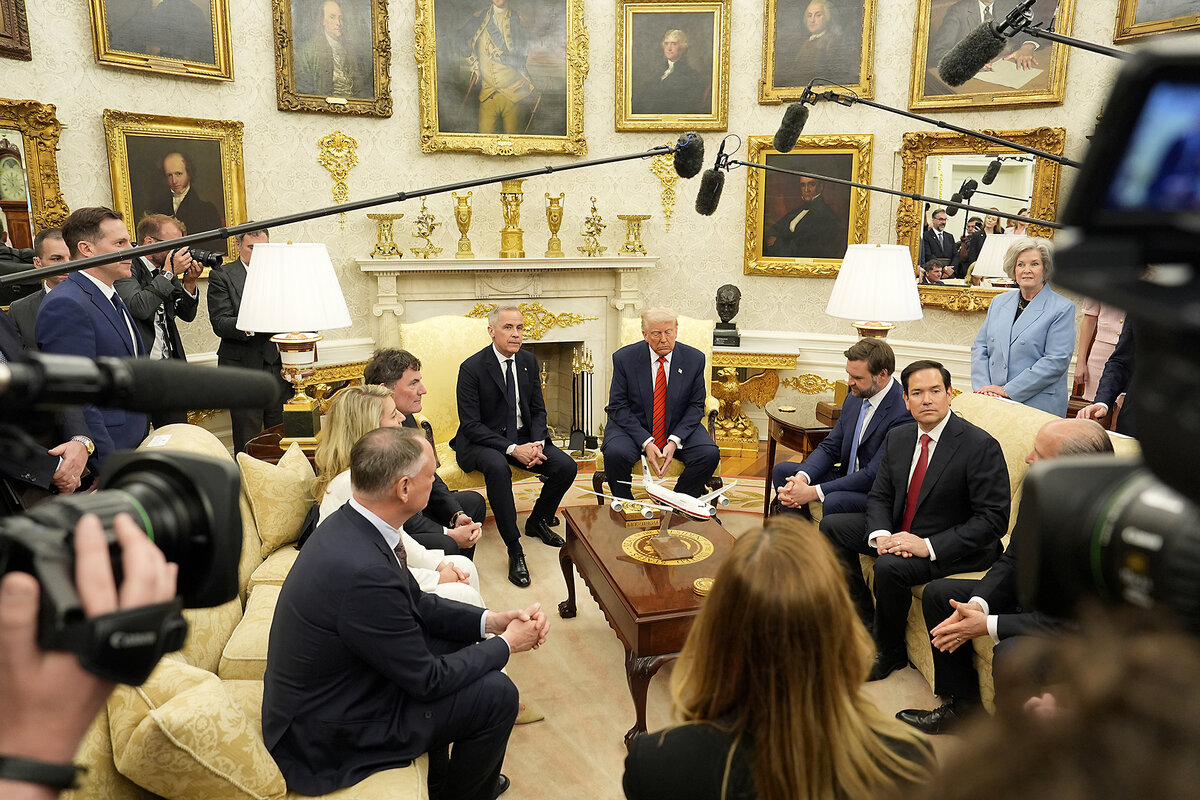Trump leans on Carney, but Canada has its own leverage in US trade talks
Loading...
| Washington and Toronto
Moments before Canadian Prime Minister Mark Carney arrived at the White House Tuesday for a high-stakes tête-à-tête, President Donald Trump poked at his guest with a social media post.
“We don’t need ANYTHING they have, other than their friendship,” President Trump said on Truth Social, listing top imports from the United States’ northern neighbor. “They, on the other hand, need EVERYTHING from us!”
It was Mr. Trump’s way of suggesting to the new Canadian prime minister, “You don’t have the cards” – the president’s infamous line belittling Ukrainian President Volodymyr Zelenskyy during their disastrous Oval Office meeting in February.
Why We Wrote This
Canada is the largest U.S. export market, yet trade tensions have been running high. A meeting Tuesday between President Donald Trump and Prime Minister Mark Carney could open the door to efforts to reset the relationship.
Except that Canada does have “cards” in its relationship with the U.S., including the commodities it exports southward, such as heavy oil and electricity, say analysts of the bilateral relationship.
“If President Trump tries to play the leverage game with Canada, they have some leverage,” says Gordon Giffin, former U.S. ambassador to Canada under President Bill Clinton.
Beyond the ongoing trade war, with U.S. tariffs on Canadian goods as high as 25%, Tuesday’s Oval Office meeting highlighted the issue that helped make Mr. Carney prime minister in last week’s elections: Mr. Trump’s continuing threats to annex Canada, and make it the 51st state.
“It’s not for sale,” Mr. Carney said. “It won’t be for sale, ever.”
“Never say never,” Mr. Trump said later on the subject. Mr. Carney, seated next to him, mouthed the word “never” several times in response.
The “51st state” threats began several months ago as a way to troll former Canadian Prime Minister Justin Trudeau, whose center-left Liberal Party appeared headed toward defeat in the next election. In March, Mr. Trudeau resigned and was replaced by Mr. Carney, the new Liberal Party leader, a former central banker who had never held elective office. Suddenly, Liberal prospects improved dramatically – with both Mr. Trudeau’s departure and Mr. Carney’s pro-Canada stance against Mr. Trump. The hockey term “Elbows up” became the winning Liberal slogan.
In both the half-hour, on-camera Oval Office meeting and the private lunch with Mr. Trump that followed, Mr. Carney’s task was to keep things civil and constructive, while standing up for Canada’s interests, analysts say. He appeared to do that, despite the tensions.
“This is the beginning of a conversation, not necessarily ‘deal day,’” says Christopher Sands, director of Johns Hopkins University’s Center for Canadian Studies.
It was the first time the two men had ever met, and thus it was a “get-to-know-you session,” on top of all the larger issues at stake.
Mr. Carney brings certain advantages to the table that former Prime Minister Trudeau, scion of a famous Canadian political family, never had. Mr. Carney’s résumé includes tours as central banker for both Canada and England, as well as years in the private sector, including 13 years at the investment bank Goldman Sachs.
“Trump will respect that kind of business record,” says former Ambassador Giffin. In fact, Mr. Trump expressed his respect for Mr. Carney as they met.
What’s more, Mr. Carney served as governor of the central bank of England during Brexit, the tumultuous period in the United Kingdom that resulted in its 2020 departure from the European Union’s political and trade alliance. Some observers draw similarities to the U.S.’s current Trump-driven move toward trade protectionism.
But at the very least, Mr. Carney’s experience with Brexit could help him now, as a newly minted politician.
“At both central banks, there were a lot of political issues swirling around him,” Professor Sands says. “He wasn’t necessarily the front man, but he’s not uncomfortable around world leaders.”
Dr. Sands also suspects Mr. Carney knows how to keep his cool: “He’s gotten by, by being positive and flattering when he needs to be.”
Gordon Ritchie, who negotiated Canada’s first free trade agreement with the U.S., says the Canadian prime minister had to withstand several Trump distortions. When Mr. Trump was asked if anything at the meeting Tuesday would change his mind on tariffs, he said no. “We don’t really want cars from Canada,” Mr. Trump said.
But that statement doesn’t show the reality of North America’s automobile industry, says Mr. Ritchie. “Going back to 1965, we’ve had an integrated automotive industry, continued under the various free trade agreements, and you will not find a car crossing the border that is solely Canadian,” he says.
Canada’s main challenge moving forward is that Tuesday’s conciliatory tone could evaporate at any moment. “His word is worth nothing,” Mr. Ritchie says of President Trump. “He’s in complete violation of the [trade] agreement that he signed, which now is ‘Canada taking terrible advantage of the Americans,’ when a little while back it was ‘the best deal in history,’ although it was almost indistinguishable from the previous [trade] deal, which was ‘the worst deal in history.’”
He says trade deals only work if they are in the mutual interest of both parties. The agreement holds together by shared interest.
“Carney is a very pragmatic guy. He is very knowledgeable about how trade actually works. He’s dealt with tough situations. He can certainly deal with this. He will explain as he sees it where the mutual interest lies, and then will act accordingly.”
At a press conference before returning to Canada, Mr. Carney said this marks the point at which “serious discussion begins.”






